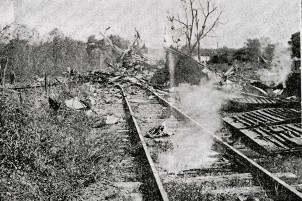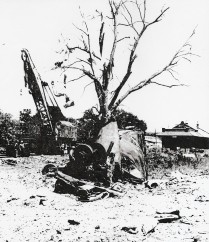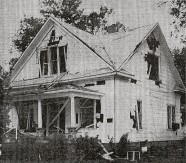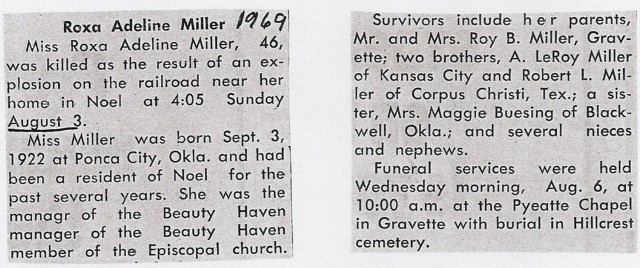A new and exciting era was ushered in when the Union Pacific and Cen
tral Pacific’s railroad tracks came together on May 10, 1869 in  Promontory Summit, Utah. When the sledge hammer drove that great golden spike into the metal and wood the age of the railroads began.
Promontory Summit, Utah. When the sledge hammer drove that great golden spike into the metal and wood the age of the railroads began.
From that moment on the great locomotives would crisscross this nation on steel tracks bringing much needed goods to large cities and small towns alike. But, in the early morning hours of August third in 1969, Kansas City Southern train #77 transported something far more ominous to the small Ozark town of Noel, Missouri, and to Roxie Miller. It brought devastation, sorrow and death to the quiet town.
Kansas City Southern Railroad trains passed through the town of Noel several times a day on tracks that divided Main Street. Not much attention was given to the locomotives, cabooses and long lines of flatcars, tanker cars and boxcars except when they came to a stop blocking traffic on downtown’s Main Street. But with a population of only nine-hundred or so even that was only considered a minor inconvenience. More often than not, the blocked street gave locals an opportunity to get out of their cars and trucks and visit with friends and neighbors stopped on their side of the tracks.
The town was visited by thousands of tourists throughout the summer months. The visitors flocked to Noel on warm summer weekends and vacationers from all over the Midwest filled the campgrounds while throngs of swimsuit clad adults and children paddled canoes while floating down the slow moving Elk River.
Main Street was a collection of older, stone buildings with signs painted on the large front windows while others identified the type of businesses with signs that hung over the sidewalks. Locals regularly enjoyed cornbread and butterbeans with a glass of sweet tea at Carl’s Café, shopped for yarn, sewing supplies, or almost anything else at the Ben Franklin Five and Dime or searched for nuts and bolts at Harmon’s Hardware. For those seeking entertainment the local theatre featured not quite so new, yet entertaining, Hollywood cinema creations which were projected onto the silver screen, but only on Friday and Saturday nights.
Small, widely spaced houses of various colors rested on both sides of the narrow residential streets. Most of the old homes had once been occupied by the parents and even grandparents of the current dwellers. Children used the normally quiet streets to ride bicycles and play throughout the hot summer months, but on the hottest of days they walked to the river’s edge and swung on a rope tied to a tree limb and fell into the cool water below, laughing all the while.
Almost everything needed by the locals could be found in a Main street store, almost. The local women traveled to Sulphur Street for their beautician needs. Two beauty shops were located on the normally quiet residential street that was no more than a block from Main Street. Kerry’s Kottage had been a Noel landmark for many years and was well patronized while the Beauty Haven shop was relatively new but already had some devoted regulars.
The Beauty Haven beauty shop was located on the ground floor of an older two story house rented by Roxa Adeline Miller, known to everyone as Roxie. The exterior of the building gave no indication that a business was operated from within, with the exception of a painted wooden sign on the porch that read “Beauty Haven Salon”. The yard was like most others on the street with grass turned yellow by the predictable August heat and a large oak tree which had been standing near the property line for more years than anyone could remember.
This was not the first time in recent years that Roxie had called Noel home but she was by no means a long time resident. Roxie made a home for herself on the second floor of the faded yellow house. For several years prior to September of 1964 Roxie lived in a small house in Noel and worked as a beautician at Kerry’s Kottage Beauty Salon. When she returned to Noel late in the winter of 1968 she decided to rent the unassuming yellow house on Sulphur Street and open her own beauty shop.
Roxie was forty-seven years old and twice divorced. She and her most recent husband lived together in Neosho, Missouri, located about twenty-five miles north of Noel. Roxie and Paul, a Neosho physician, had no children together and after the marriage failed Roxie relocated to Noel with $8000, her maiden name and many regrets. Roxie wanted to start a new life and Noel was only twelve miles from Gravette, Arkansas where her parents lived. Roxie wanted to live relatively near to her family yet far enough away so she could maintain her independence and some level of privacy.
On Saturday, August 2, 1969 Roxie started her day just as she had on every previous day when her beauty shop was open for business. She arose around 8:00 a.m. and put two slices of bread in the toaster. As the bread transformed into lightly browned toast Roxie made coffee. While enjoying her morning meal, she went over the day’s schedule in her mind. There was only one appointment scheduled. Roxie recalled that Polly wanted her hair cut and styled at 10:00 a.m. that morning. Although no other appointments were on the schedule, ladies often called at the last minute asking if Roxie could squeeze them in. Roxie always seemed to accommodate them even if she needed to stay open well past the scheduled 3:00 p.m. Saturday closing time.
Roxie put the bread crust, a small plate and the coffee cup in the sink. She would wash the dishes, and those from the night before, later. After her morning chores were finished she got dressed and went downstairs to the shop. She turned on the lights, swept the floor and arranged the bottles of chemicals the ladies regularly asked for. She then turned the sign hanging in the front window from “closed” to “open”.
Polly was Roxie’s first customer and asked for the same haircut and styling Roxie knew so well. As Roxie fashioned Polly’s hair the two talked about the hot August weather, townsfolk, and the large number of tourists at the campsites just outside of town. Roxie told Polly she was the only scheduled appointment that day and she hoped business would be slow as she had plans that evening.
Roxie said there was a band playing at Shadow Lake, a place in Noel along the river where people danced and drank, that evening and she wanted to clean her upstairs living area so she could get to the club at around 8:00 p.m. As Polly paid for her cut and styling she told Roxie she hoped business remained slow that day so she could go to Shadow Lake that night. As Polly left she said “have fun”.
The rest of the day passed slowly, and there were no more customers. Roxie passed the time cleaning the shop and reading magazines normally perused by waiting customers. The ladies often read and talked about the magazine articles and advertisements found on the pages. Three o’clock came and Roxie turned the sign in the front window to “closed”.
Roxie tried to maintain a healthy lifestyle even before it was considered trendy. She often ate a sandwich accompanied by an apple or orange for lunch. She washed the food down with a glass of tea, or maybe just water. That Saturday Roxie straddled her bicycle and rode it on the narrow residential streets of noel, waving to friends as she passed. She peddled the bicycle to Kilmer’s Grocery Store where she bought a couple of needed items, then rode the bicycle back to her home. Roxie spent the remainder of the day, and well into the early evening hours, cleaning her upstairs living space.
As the evening hours grew nearer to 8:00 p.m. Roxie got ready for the night of dancing. The attractive woman of average height pulled her dark brunette hair back, as she often wore it, and dressed for the evening. Most people remembered Roxie’s eyes. They were described as alive and captivating, and although Roxie’s nature was normally that of someone who was reserved, everyone familiar with Roxie realized she knew how to have a good time.
Roxie, excited about the evening to come, left her house at 8:00 p.m. At that same moment Kansas City Southern train #77 was pulling out of the Kansas City train yard. The diesel locomotive was pulling 115 cars, and heading south on a trip that would take the train to a final destination of Shreveport, Louisiana.
Shadow Lake was crowded with people dancing, talking and drinking. The music was loud as was the laughter. The lights were bright and the reflections bounced off the water of the slow moving Elk River. Roxie was enjoying herself and danced with everyone who asked. The time passed quickly and Roxie kept dancing because she knew the band would stop playing at 1:00 a.m.
Southbound train #77 pulled into the Pittsburg, Kansas yard at 10:34 p.m. A three hour layover was scheduled that would allow a new crew to take over. The new brakeman, Norman Sackett, walked the long line of cars searching for anything unusual. He reported to the engineer that everything appeared normal and at 1:46 a.m. the train left the Pittsburg yard traveling south.
A tired Roxie arrived home at about 1:30 a.m. and too tired to bathe she undressed, put on her nightgown and fell into bed. Although it was a warm night she was fast asleep within minutes. Train #77 with its new crew passed through Asbury, Missouri at 2:01 a.m.
While Roxie slept and dreamed, train #77 rolled on steel tracks passing through the Southwest Missouri Ozark towns of Joplin at 2:14 a.m., Saginaw at 2:34 a.m., Neosho at 2:45 a.m., Goodman at 3:10 a.m., Anderson at 3:26 a.m. and Lanagan at 3:38 a.m. The next town in the train’s path was Noel.
 As the train approached Noel, brakeman Sackett discovered that sealed containers of ammonium perchlorate, an agent used in munitions propellant, and the flatcar they rested on were on fire. Sackett notified train #77’s engineer who brought the train to a stop leaving many of the cars just outside the town. The fire was burning through the flatbed car and onto the tracks. A series of small explosions occurred and according to Noel Police Officer Paul O’Brien a plume of dark black smoke rose into the sky. A decision was made to move the train through and beyond Noel where it was thought the fire could more effectively be controlled but the situation was about to take a disastrous turn.
As the train approached Noel, brakeman Sackett discovered that sealed containers of ammonium perchlorate, an agent used in munitions propellant, and the flatcar they rested on were on fire. Sackett notified train #77’s engineer who brought the train to a stop leaving many of the cars just outside the town. The fire was burning through the flatbed car and onto the tracks. A series of small explosions occurred and according to Noel Police Officer Paul O’Brien a plume of dark black smoke rose into the sky. A decision was made to move the train through and beyond Noel where it was thought the fire could more effectively be controlled but the situation was about to take a disastrous turn.
Volunteer firemen, law enforcement deputies and neighbors asked those awakened by the sounds, smoke and fire to evacuate the area at once. As Roxie stood outside gazing in disbelief at the sight of the fire the thick black smoke began to suffocate her and the strong chemical smell in the air caused her eyes to burn. Neighbors, with raised voices, were telling everyone to leave but first Roxie needed to go back into the house and climb the stairs to the second floor. She needed to gather her shops receipts and her purse.
As boxcars containing dehydrated alfalfa passed over Noel’s Main Street and the burning railroad ties, the railroad cars volatile cargo exploded. At 4:03 a.m. a red ball of fire rose high above the town which was accompanied by a blast that was heard over thirty miles away. Those still lying in their beds were brusquely awakened as they were thrown onto the floors below.
Large pieces of metal that were once railroad cars and steel tracks were sent hurtling through the air. Those missiles crashed through windows, walls and roofs in search of random targets. An eight hundred pound wheel, once part of a boxcar, crashed through the bedroom wall and into the home of Virgil and Lottie Bentley severely injuring Lottie while she lay in bed.
Shards of glass that were once store fronts and windows in homes came to rest in yards and on rooftops and inside houses. Many people were cut by the sharp dagger-like pieces of broken glass. Scarcely a window was left unbroken as a result of the blast’s concussion and subsequent release of debris.
With the appearance of that Sunday’s morning sun also came the full extent of the horror that had not been previously visible when darkness covered the town. Help from nearby communities arrived as did railroad employees. That Sunday, Red Cross tents were set up on Main Street to provide aid. Ambulances continued to sound their sirens throughout the day as the injured were taken to hospitals while people walked the streets with blank stares as they no longer recognized those once quiet neighborhoods. That afternoon, local resident Bruce William Green died of a heart attack at the age of 81 while talking to people on Main Street. Doctor Stiles stated the heart attack was brought on by anxiety resulting from the explosion.
In the weeks following the explosion the railroad’s insurance company agents sat behind tables placed on Main Street sidewalks and issued claim checks to those reporting damaged property. Approximately two million dollars was ultimately dispersed.
By Monday afternoon, Kansas City Southern workers had repaired the damaged tracks and trains once more began to pass through Noel. The fifteen foot deep by fifty foot wide crater born out of the blast would not prevent the locomotives and cars they pulled from riding on the new tracks.
In the hours following the blast volunteer firemen, police officers and friends and neighbors walked the streets and went house-to-house looking for those in need of help. Two volunteer firemen walking down Sulphur Street came upon what remained of Roxie’s house. There were large holes in the roof and walls and all the doors and windows had been blown away.
The two called out, asking if anyone was inside but there was no answer. As they approached the front of the home they could only hope that no one had been inside when the blast sent deadly projectiles of steel and glass tearing through the house. The two stepped over debris and entered the rubble filled lower level: It was hard to imagine that someone had once lived there. Their eyes then looked to the stairs and there, dressed only in a blood stained nightgown, laid Roxie’s still and lifeless body. She had never completed her journey up those stairs to retrieve her purse. It was later determined that she was killed when glass and metal fragments plunged into her back and entered her chest. Roxie’s existence in this mortal world tragically came to an untimely end that early Sunday morning in August when Kansas City Southern’s train #77 came to Noel. Roxie did eventually go to Gravette, Arkansas. Roxa Adeline Miller, that feisty beautiful woman with the unforgettable eyes, was buried in Hillcrest Cemetery on Wednesday August 6th.
In the weeks following the explosion windows were replaced and some stores reopened while others were gone forever. Repairs to damaged homes began but some badly ravaged structures would eventually be torn down, leaving only grass covered vacant lots. A neighbor and friend of Roxie’s watched as one day two men collecting debris stopped their truck in front of the old beauty parlor. Some items were collected from the yard and thrown into the back of the truck. One of the men came from the side of the shell of a house carrying an old and damaged bicycle. The neighbor considered asking what was to become of Roxie’s bicycle but she reconsidered and just watched as the bicycle was tossed in the back of the truck.
Even now, as the darkness takes possession of the late night and early morning hours, the distant sound of a train whistle causes the eyes of the light sleepers in Noel to open. Those who hear the sound of the great locomotive’s engine lie motionless in their beds, afraid to move or make a sound. They listen as the train gets closer and only after the mournful cry of the whistle and noise of the mighty engine fades away do their eyes once more dare to close.
